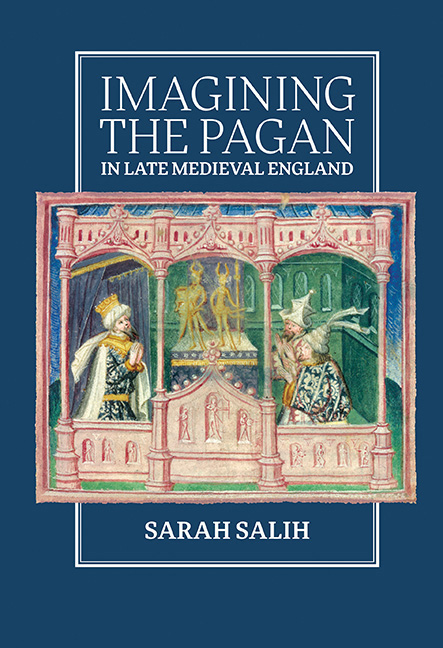1 - Origins: Building Cities, Making Idols
Published online by Cambridge University Press: 15 October 2019
Summary
We begin with the pagans as originators and fabricators, who found cities and civilisations, and build the idols to put in them. In this chapter, pagans showcase their preternatural skills in material culture, creating environments that body forth their values and persist beyond their original times. Troy, in Lydgate's Troy Book, is the central example of a city that is both ancestral to those of medieval Europe and an improved version of it, a point of origin and an aspiration for the future. Lydgate, Pecock and Capgrave tell variants on the origin-story of idolatry, scrutinising the process by which a material object become an agential being: the range of these stories is visible in the diverse iconography of idols. Pagans’ failures play a part in the transformations of memorial images into idols, but so do their skills in constructing artefacts and ritual attentions to them. Idols outlive their makers and exceed their intentions. Finally, pagans showcase their capacities in a time-suspending tomb-shrine for Hector, a happy object that a fifteenth-century tapestry then makes present.
Troy
Pagans found the cities that are destined to become the inheritance of Christians. Geoffrey of Monmouth's origin narrative of Britain's settlement by Trojan refugees, widely understood to be historical, added historical and political import to the inheritance of classical material. If space is, in Doreen Massey's phrase, ‘the contemporaneous existence of a plurality of trajectories; a simultaneity of stories-so-far’, Britain's space is the result of the meeting of the trajectories of Trojan refugees and of the giants, descendants of a gang of princesses on the run from the patriarchy and their demon lovers. Trojans found and represent order and hierarchy: noble male warriors overthrow monsters and the monstrous traces of female rule. They are the central example of the translatio imperii described by Laurie Finke and Martin Shichtman: ‘In contrast to the Orientalism described by Said, colonization is often described by medieval writers as moving from the settled East to the barbaric West (from Troy, for instance, to England).’ Medieval narratives of Trojan origins think of Britain as a postcolonial zone, but the ‘post’ applies only in a strictly temporal sense: insofar as the territory is still colonised, that condition is taken to be benign and unproblematic.
- Type
- Chapter
- Information
- Imagining the Pagan in Late Medieval England , pp. 33 - 72Publisher: Boydell & BrewerPrint publication year: 2019



